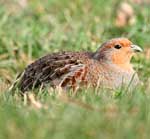RSPB criticises CAP reform
The society believes that the new CAP proposals don’t give enough support to agri-environment schemes


Exquisite houses, the beauty of Nature, and how to get the most from your life, straight to your inbox.
You are now subscribed
Your newsletter sign-up was successful
The RSPB has raised concerns that the reform of the Common Agricultural Policy (CAP), to be published in October, doesn't give enough emphasis to agri-environmental schemes a leaked document reveals plans to allow EU member states to move money away from such schemes. This comes in the wake of new figures showing that farmland bird populations across Europe are at their lowest level since records began.
The wheat-ear, down by 69%, heads the list of declining birds, followed by the grey partridge, rustic bunting, goldcrest, nutcracker, lesser-spotted woodpecker, black-tailed godwit, meadow pipit, lesser grey shrike and linnet. Jenna Hegarty, the RSPB's CAP policy officer, says: ‘These figures are no coincidence.
The CAP has helped farmers to produce more food, but wildlife has suffered as a result. Now, we have an opportunity to reform the CAP and make it address today's challenges, one of which is a massive loss of biodiversity. Many farmers are doing brilliant things for wildlife, but there still isn't enough money in the pot.' Jon Birchall, farm manager at Offley Hoo in Hertfordshire, says that schemes that allow the public to reward wildlife-friendly farmers, such as Conservation Grade, with end products labelled as ‘Nature Friendly Farming', work well. Jordans was the original supporter, and brands such as Vitacress and Allied Mills have followed.
He explains: ‘Scientifically proven biodiverse habitats are grown on the least productive 10% of the land, so that overall yields are hardly compromised. Crops grown efficiently on the remaining land are sold for a premium to licensees that market the produce under the Nature Friendly label. If consumers want to support biodiversity, they opt to pay for it. It worked for organic, so why not this?'
NFU criticises leaked CAP proposals
The NFU president has also written to the European Commissioner, Dacian Ciolos, to express concern over leaked CAP proposals. Peter Kendall says basing direct payments to farmers on compulsory actions, rather than ‘willing partnerships'-such as Entry Level Stewardship-may discourage farmers from entering schemes, fearing more land will have to be set aside. ‘If farmers are forced to set aside at least 5% of productive land and devote another 5% of arable land to a third crop, we will run into supply issues very quickly,' he says. ‘I see some perverse and unintended consequences.' Mr Kendall cites the proposal for land that has been grass for five years to be fossilised permanent pasture as a worry-‘the definition of permanent pasture must be flexible enough to allow farmers to improve their grass leys'-and describes as ‘unbelievable' the proposed ban on ploughing carbon-rich soils: ‘Severe restrictions could be placed on some of England's finest soils [leading to] production being exported elsewhere.'
* Subscribe to Country Life and up to £50
Exquisite houses, the beauty of Nature, and how to get the most from your life, straight to your inbox.
Country Life is unlike any other magazine: the only glossy weekly on the newsstand and the only magazine that has been guest-edited by His Majesty The King not once, but twice. It is a celebration of modern rural life and all its diverse joys and pleasures — that was first published in Queen Victoria's Diamond Jubilee year. Our eclectic mixture of witty and informative content — from the most up-to-date property news and commentary and a coveted glimpse inside some of the UK's best houses and gardens, to gardening, the arts and interior design, written by experts in their field — still cannot be found in print or online, anywhere else.
